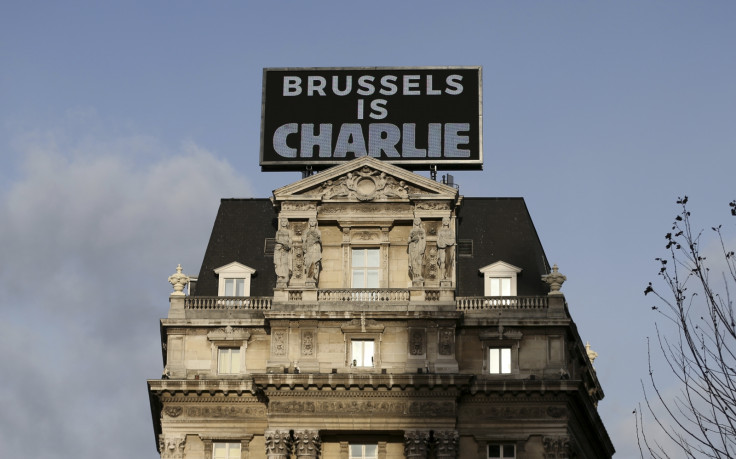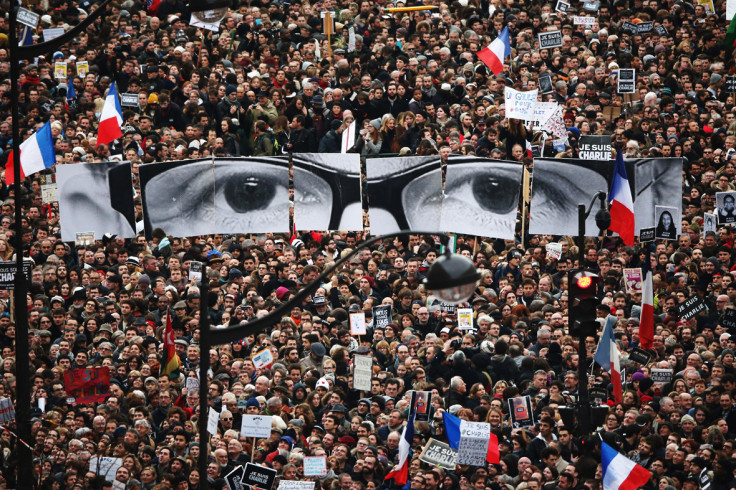Charlie Hebdo Paris massacre: Everyone says 'Je Suis Charlie' now, but where were they when my friends were alive?

It was in September 2012, shortly after my escape from Ukraine to France, that I first met the Charlie Hebdo team in Paris. Beginning with an interview about Femen, we soon discussed possible collaborations.
At that time, not knowing much yet about France's reality, and only guessing what France really looked like, I was extremely lucky to encounter that first, friendly face of the country: the face of Charlie Hebdo.
With strong liberal convictions, the Charlie Hebdo team hated religious institutions and right-wing politics. They worked as journalists but lived as activists.
That day I was brought to Charlie Hebdo's office by Luz, the great cartoonist and friend who escaped last week's massacre. I noticed a group of police officers were stationed in front of their building and asking if something had happened.
Luz laughed at this question, saying this was Charlie Hebdo's daily routine since the bombing of its previous office following the publishing of a cartoon mocking Mohammed. "We don't know what will happen next, as we continue to work. This is why the police are here," he said.
When we entered the main room, I saw a large round table and three elderly men sitting around it with dozens of colour pencils. They were drawing, placing their hands as children do to avoid being copied by their neighbours. It was Cabu, Honoré and Wolinski. They looked at me without saying anything and continued to draw, hiding their pieces from each other.
Suddenly someone greeted me with the words "Bonjour, tovarish" ("comrade" in Russian), while holding a hand in front of his face, copying the pioneers' sign from the USSR era. It was Charb (Stephane Charbonnier ), the editor-in-chief of Charlie Hebdo.
I was surprised but pleased by the communist references made by this man, who was wearing glasses as well as strange, military-coloured trousers and a warm but shy smile. The rest of the team was having a tense discussion in another room.
This first visit to Charlie Hebdo convinced me activism and radical positions are not solely reserved for young people.
We soon became friends and ideological comrades. After working together on the issue of "Charlie Hebdo avec Femen", we did not often ask each other about our positions on particular topics, as we knew it was very likely we would agree, even though we still argued a few times. But whenever we met, we were making fun of politicians and religion, and sometimes telling each other about the threats that we both received.
In the summer of 2013, after Femen's office was burned by unknown attackers overnight, Charb told me, with heavy irony, that we should be ready to explain to the public why Femen decided to burn the office, how we did it, and what we wanted to achieve. He was alluding to the reaction that came after Charlie Hebdo's office bombing, when many accused the Charlie staff of organising the attack on purpose to get attention.
After the fire, they were warning us, saying we should get ready for the "next attack", as they were. However, they also laughed about the prospect, saying, for Femen, it would be easier because Charlie Hebdo would receive the first assault, and we would know how to prepare for the next attack.
We felt connected, not only ideologically but because we knew we lived similar lives with threats and attacks, and similar reactions to our activities. Whenever Charlie Hebdo published a new drawing of Mohammed or mocked Islam, whenever Femen protested against a new act or terror or oppression, we would be roundly condemned and branded "Islamophobes". Whereas this was amusing to us, we also felt lonely because of the "political correctness" of many people who shared our thoughts but did not express their agreement publicly.

The world was scared
But today, Charlie Hebdo is not alone, as all the world claims they are Charlie. The cartoonists are no longer Islamophobes, but free thinkers. And the only difference is that they are dead. Do we really need to have 12 dead journalists to admit they were free thinkers?
This massacre happened not only because of the existence of Islamism, but also because the world was scared to say "I am Charlie" when they were still drawing. Our modern society is a coward that is turning away from everyone who bravely denounces the truth in a non-violent creative way like Charlie Hebdo. People are scared to publicly support direct action and messages even if they totally agree with them.
Paradoxically, people are scared of freedom of expression in its pure form. If Charlie Hebdo were not lonely revolutionaries before, surrounded by the silence of hidden supporters, if their cartoons were republished by other media or not blurred and censored in the reports as an example of crime, Cabu, Charb, Tignous, Wolinski, and Honore would continue to draw.
With the murders at Charlie Hebdo, we did not lose freedom of expression, we lost the greatest contributors to the freedom of expression. We lost its faces, its names.
Hopefully we did not lose Charlie Hebdo altogether, as it has plenty of reasons to laugh and mock again, as it always did. The fact that Benjamin Netanyahu and Sergei Lavrov joined the march on 11 January, in support of values they themselves reject, would certainly have pleased Charlie. The cartoonists have the power, and the reasons, to continue, now more than ever.
But once the new issue of Charlie comes out, once new caricatures of Mohammed will be published, will there be the same silence, will they be alone again?
Inna Shevchenko is leader of the feminist protest group Femen, which often makes headline news across the world for demonstrating topless. Visit the Femen website or Twitter feed, or Inna's personal Twitter account, to find out more.
© Copyright IBTimes 2025. All rights reserved.






















